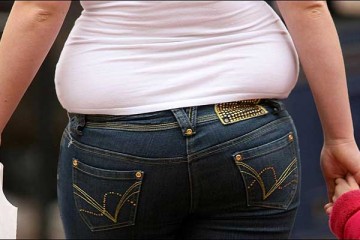Fight Belly Fat, There Are Health Risks
What Are the Health Risks?
There are actually different kinds of fat that accumulate in your body, and around your waist line, it's not the subcutaneous fat that you can grab on to that we call 'love handles' that's of most concern; it's the fat that's lying underneath closer to the organs, none as visceral fat, that's of most concern. The accumulation of visceral fat is an indication of inflammation and other health concerns.
In the article 'The Truth About Belly Fat' on WebMD, Michael Jensen, MD, shared, "Extra weight around the midsection is associated with inflammation and a higher risk of health problems such as cardiovascular disease, diabetes, metabolic syndrome and more"
Belly fat increases your risk of colorectal cancer, diabetes, breast cancer, heart disease, high blood pressure, metabolic syndrome and gallbladder issues. In addition, as reported by MayoClinic, researchers have found that belly fat is made up of fat cells that aren't simply dormant energy to be burned up, but rather, they are active cells that produce hormones and other substances that may impact your health. For example, some of the fat cells can produce estrogen after menopause increasing the risk of breast cancer. Others promote insulin resistance that can lead to type 2 diabetes.
Do You Have an Unhealthy Amount of Belly Fat?
To determine if you're carrying around too much, use a tape measure to measure your belly right around the area level with your navel. For an accurate measurement, relax as you measure and don't hold your breath or pull the tape measure too tight. If a man has a measurement of 33 inches or more and a woman has a measurement of 35 inches or more, then they're likely carrying around too much belly fat that points to the health risks mentioned within this article.
What Helps Fight The Dreaded Fat?
The reasons range from poor diet to lack of exercise to menopause to heredity, but regardless of why you have it, it's important to do what you can to minimize and eliminate it. Factors that can aid in reducing include:
Regular exercise that includes a cardiovascular program.
Eating a proper diet high in fiber, whole grains, lean protein and healthy, low-starch fruits and veggies like berries and leafy greens.
Reducing stress to reduce cortisol release, a hormone that promotes belly fat and increase in hunger.
Hormone therapy in menopausal women to balance out the shift in hormones that may promote belly fat deposits.
Belly fat is not a laughing matter, so educate yourself about the topic so you understand your specific situation; what's causing your belly fat and what's the best way to tackle it for better health and weight loss all the way around.
Related Articles
-
Belly Fat Reduction
Belly fat reduction is a major concern of many people in todays moder
-
Practical And Easy Steps To Lose Belly Fat Fast
Want to have flat abs? Lose belly fat fastIf belly fat is your realit
-
Walk Off Your Excess Belly Fat
Most of us are aware of the fact that walking is a great exercise and
-
How To Lose Stomach Fat - Find The Absolute Best Way Today
How to lose stomach fat is perhaps the most frequently asked question
-
Discover the Fats about Diet and Belly Fat Relationship
Do you ever ask yourself if there is a connection between diet and be
-
Food Regimen To Lose Belly Fat
If losing your tummy fat seems impossible, bear in mind that you aren
- DON'T MISS
- The Best Diet For Belly Fat
- Belly Fat Diet Foods That Slim Down Instantly
- Discover the Secrets to Losing Belly Fat Quickly and Easily
- Lose Belly Fat By Drinking More Water
- Successful Belly Fat Loss In Five Easy Steps
- Get rid of Belly Fat
- Belly Fat, What Causes It and How to Get Rid Of It
- The Easiest Way To Dispose Of Lower Belly Fat - 4 Techniques For You To Lose The Fats
- 500 Calories to a Flat Belly
- The Get Rid of Belly Fat Mindset, Ensuring Victory




